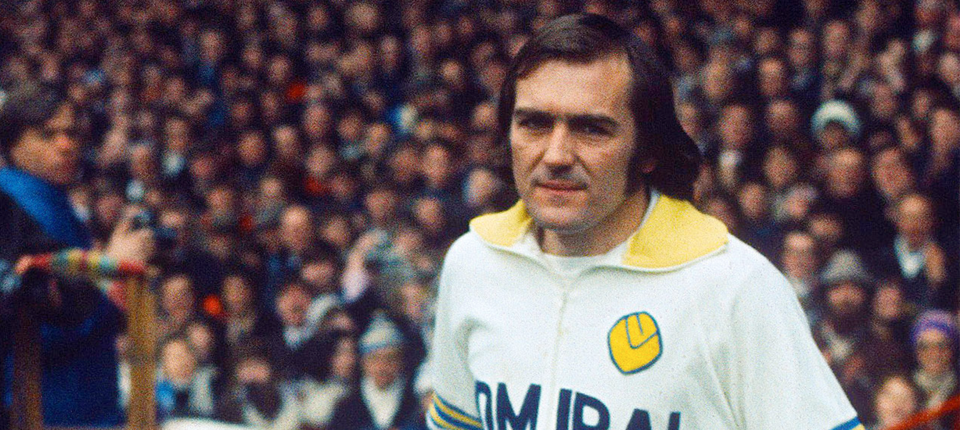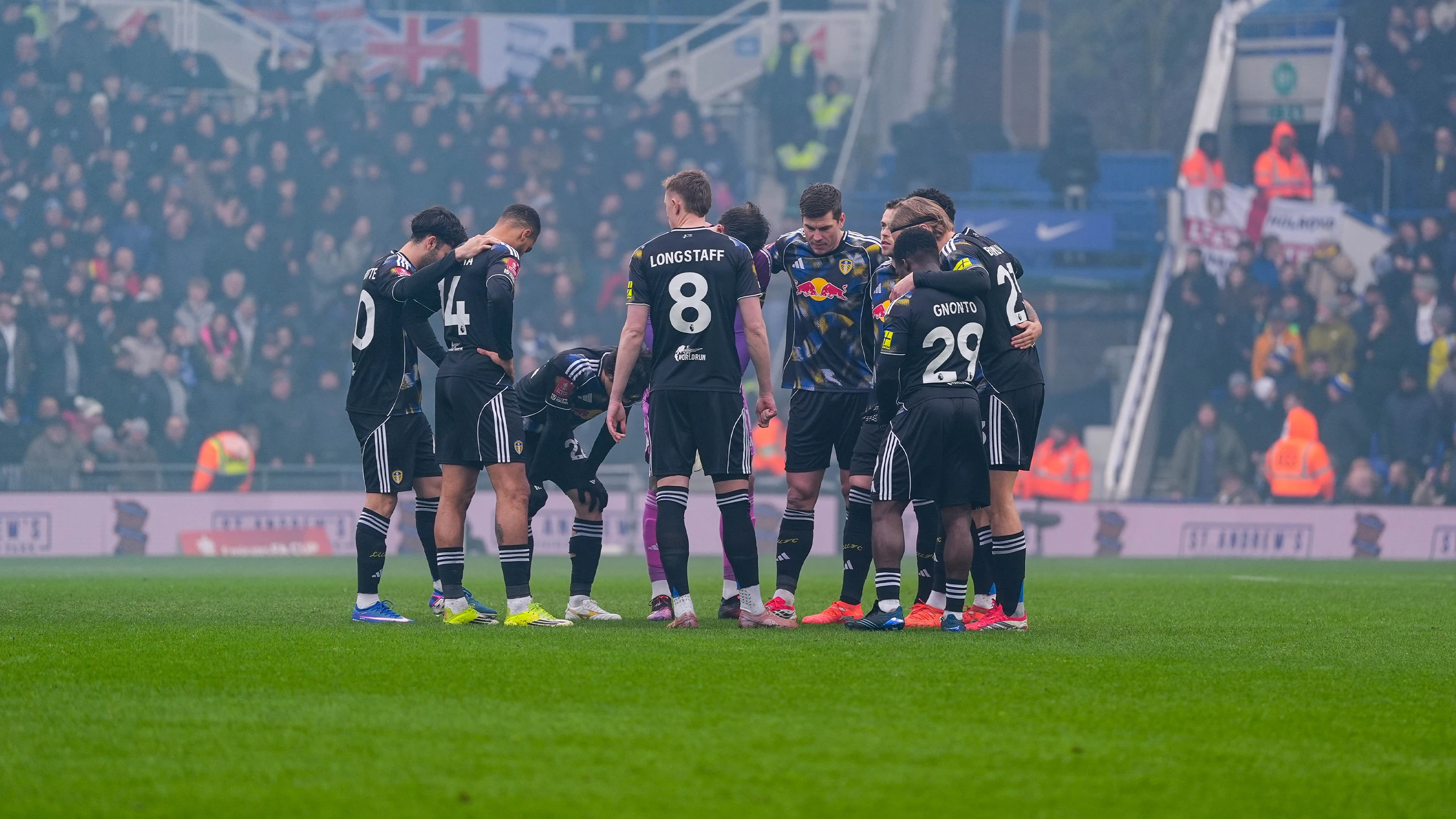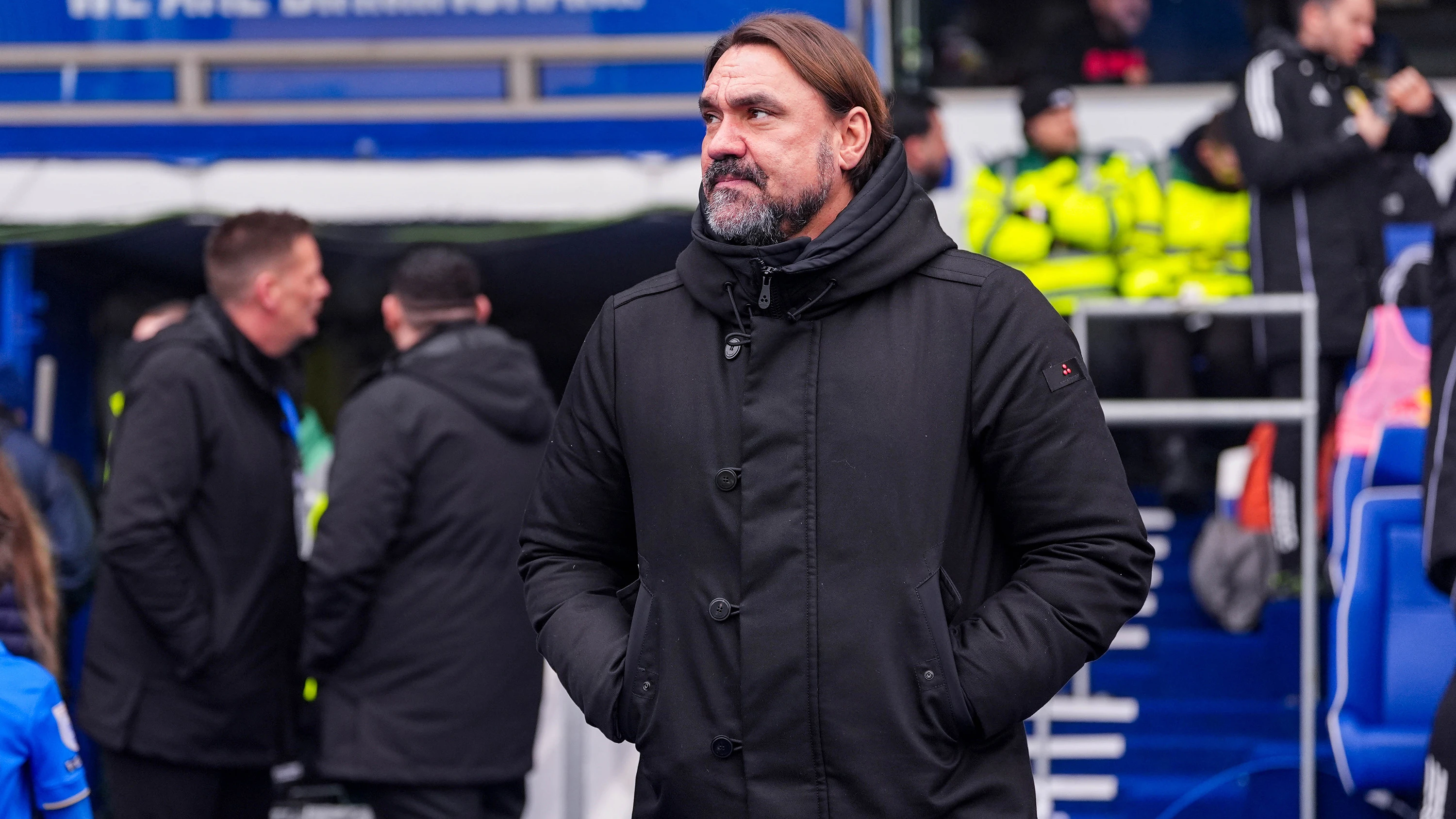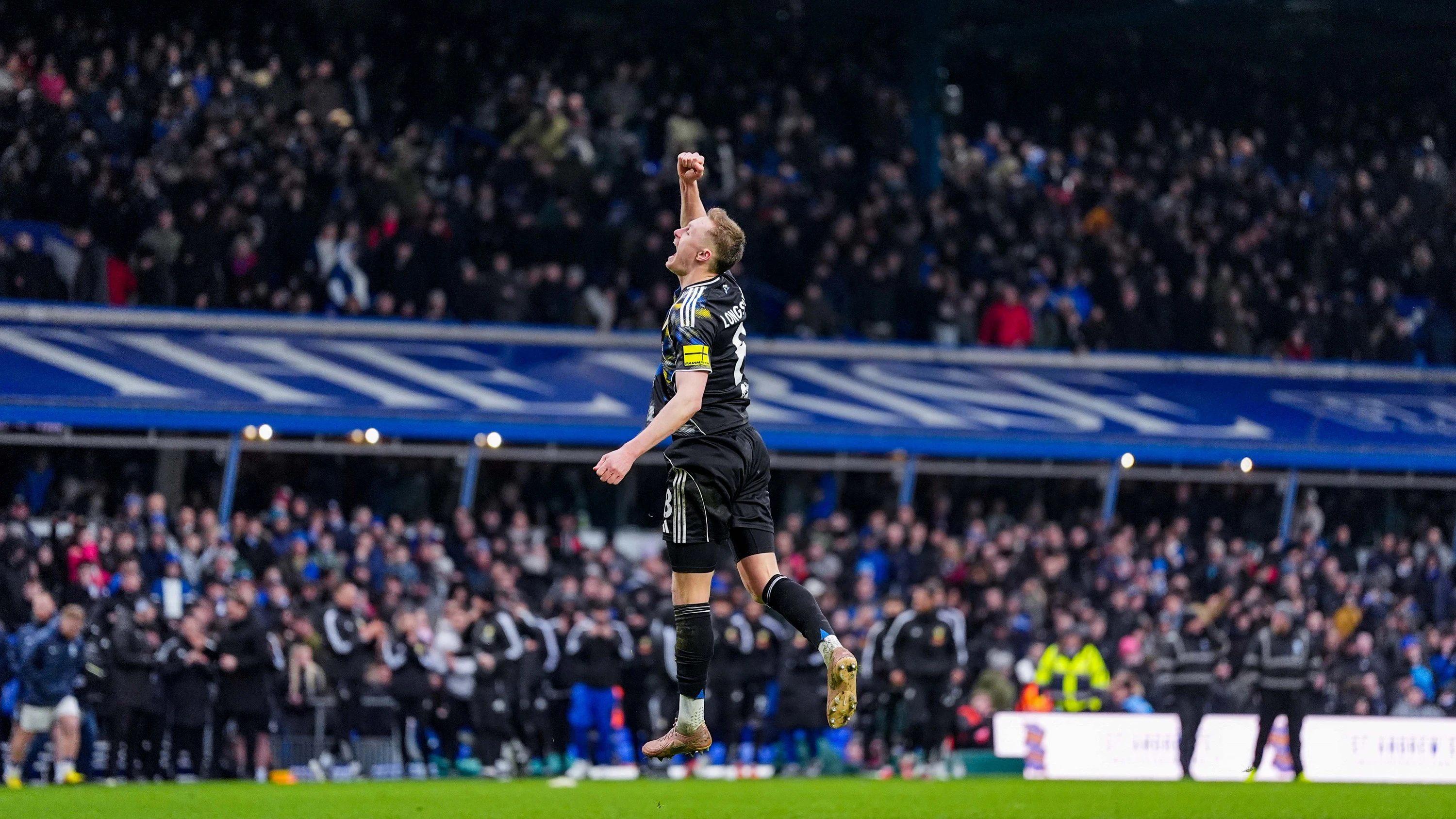351 appearances for Leeds United over a 10 year period, he would witness the Whites transformation under Don Revie, score the goal that secured the club's first ever major trophy and be revered as one of the inventors of the modern wing-back role. Read more about Terry Cooper's Leeds United journey...
A young lad from Ferrybridge, near Castleford, in the heart of rugby league territory, how did you end up playing football for Leeds United?
Well, I went with the family to rugby league every week; Castleford one week, Featherstone the other. But for some reason I always wanted to be a footballer, even though I didn't really have any heroes or role models - and certainly not at Leeds. They weren't big at all where we were from and as it took over an hour-and-a-half on the bus by the time you'd gone through all the villages, not many could be bothered to make the effort to get up there! I never really thought I would make the grade as a player, you just didn't expect it, I just played because I loved it. I turned out for Ferrybridge Amateurs in 1961 until someone spotted me and asked me to go to Leeds for a trial.
Leeds were near the bottom of the old Second Division and not showing many signs of a renaissance... What was the atmosphere like at Elland Road?
Don Revie had just gone there, he'd only been at the club about three months when I arrived for the trial. Leeds hadn't really had a youth policy as such and that was the first thing Don wanted to do, have a group of 12 to 15 young players around which he could develop a team. If anyone showed anything at all in the local leagues, you had a chance. I remember at the trial playing against Paul Reaney on the old Fullerton pitches - I didn't know who he was at the time, obviously - but I was a left-winger and he marked me that day. Of course, he kicked me all over the place, but I must have done something right because I was offered terms straight after the game.
Was there a moment when you sensed that this Leeds side, with all the youngsters coming through, was going to really go places?
No, not one moment. Don simply realised that the players he had at his disposal weren't good enough, so he started giving the kids a try, drafting in the likes of Norman Hunter, Gary Sprake and Rod Johnson. They all did well and that set a precedent for the likes of me, Paul Reaney and Paul Madeley. But it never really felt that special, even when we were winning stuff. We just loved playing football together, there were no egos or anything so you never felt like superstars, or that you were doing anything out of the ordinary. It was a great environment in which to learn. I suppose an important point was the signing of Bobby Collins, he was superb and really looked after me when I made my debut in 1964. When I would get a kick or someone was trying to intimidate me, he would shout; "You keep playing son, I'll sort them out..." And, by God, he did - and he was only five-foot-two or something.
Johnny Giles must have been another important arrival as well, that must have signalled Don's intent?
Johhny was an influence, definitely. But Don was shrewd like that - he knew he had these brilliant kids, and where he didn't have kid good enough in certain positions, he filled the gaps with real quality. Johnny, Allan Clarke and Mick Jones were brought in and that was our team for ten years.
And Billy Bremner was already there...
Well, he was the one, wasn't he? Unbelievable. He could have played anywhere on the park, he was that good. Just look at the goals he scored in important games - in Cup Semi-Finals or title run-ins - and he never got injured. You look at the money being spent on player today, and if Billy was around no one could afford him - no money would be enough for Billy. What a player! On the pitch he was a great leader as well - and there was a lot more banter between players in those days. Billy, Johnny and Norman would scare the opposition stupid, and Billy would spend 90 minutes shouting to Jack: "When you've had enough of him, big man, chip him over to me..." They didn't have a chance!
You were playing on the left wing for your early appearances at Leeds, when did the switch to left-back occur - and did you think it was going to be permanent?
I'd player anywhere, me. I wasn't bothered as long as I was in the team, getting a game. At first it seemed to be that Albert Johanneson would play at home and I would play away - I think Don recognised the fact that even though I was a winger I got stuck in quite a lot, which you needed away from home. We had Willie Bell at left-back at that time and he was a solid professional, but was getting on a bit and Don wanted to try me there and see if it would work out. Again, though, I was lucky with the players I had around me - and when you've got Eddie Gray, Norman and Johnny on the left side of the park, my role wasn't really any different!
The year of 1968 was a special one for you, winning your first England cap and scoring the winner at Wembley against Arsenal in the League Cup for Leeds' first trophy. Where does it rank in your career?
The League Cup was important as it was our first trophy, and I did score the only goal, but it was one of those when you close your eyes and hit it. It flew into the top corner but it could just have easily hit the corner flag. It was good for me, though, it helped me get my name known and I think it was one of the reasons I got an England call-up soon after. To actually play for your country is an amazing feeling, brilliant. A lad like me from this tiny village in West Yorkshire playing for England, I couldn't really take it all in.
What were your other highlights?
Playing in the World Cup in Mexico, 1970 obviously, although most of the lads were incredibly tired after a marathon League campaign. I know I wasn't feeling 100 per cent. Then there were the Juventus games of the Fairs Cup Final in 1971, they were exceptional. Juventus were the team of the moment, but in a footballing sense we really turned them over and that was very satisfying. But every game in those days was a big game, and I suppose the real highlight was playing with 17 or 18 players who you knew would die for you on the park - I only wish it lasted longer, it seemed to fly by. Just going in every morning and being around all that quality was unbelievable. After I left Leeds I was involved in coaching, and it was really difficult to get players to attempt the stuff we were doing; one-touch passing games for instance. And I consider it an absolute privilege to have played alongside the two greatest left-sided centre backs in football: Bobby Moore and Norman Hunter. Norman never really got the recognition for the ability he had as a player - he started as an inside-forward, and he probably could have stayed there.
The squad had such a strong desire to win, it must have been hurt by the runners-up spots throughout the period?
It made us stronger as a team and we always came back even more determined. But we were just being asked to play too many games. Take 1970, the season was shorter because of the World Cup and in a week I think we had to play a Cup Final, a European Cup Semi and a title decider. I mean, a couple of days off would have been nice, but you just had to keep going. Also, there were loads of better teams back then, you had five or six excellent teams competing every year so to win trophies was always an achievement.
Some managers have been knighted for their achievements in the game, does it rankle that Don never received similar acclaim for his work at Leeds?
If you speak to anyone at Leeds, anyone who played for him, they would not hear a bad word about the boss. He was an absolute god. Being England manager is the hardest and biggest job there is and it doesn't matter how good you are, sometimes it just doesn't work out. But people shouldn't forget the way he ran Leeds was revolutionary. He was 30 years ahead of his time; he introduced better diets of fish, chicken and vegetables, got rid of the traditional steak; the medical facilities were incredible; the training was spot on with Syd Owen and the preparation before each game immaculate. We were always put up in hotels before each game just so we could be together and away from our families and so on - and his knowledge of the game was second to none.
You broke your leg in 1972, and were out for over two years. How big a hole was taken out your career?
I was definitely at my peak when I broke my leg but it may not have been so bad had the surgeons not made a massive mistake. I had to go over to Manchester to have it reset and I was never really the same when I came back. I'd lost something, a yard of pace or a bit of sharpness. The edge had gone out of my game. But Jack Charlton had become boss at Middlesbrough and he was a shrewd cookie and could see that I could do a job for him. Mind you, when I went to 'Boro, I was convinced I was definitely finished because I never saw the ball. At Leeds, Norman would feed Billy or Johnny, Eddie would come inside and take the full-back with him and I would overlay. A 40-yard pass would then land at my feet and we were on our way. At 'Boro, I had nothing like that at all and I thought it was down to my injury. So I said as much to Jack, and he just turned round and said: "Don't be so bloody stupid, this is Middlesbrough, we don't have a Johnny Giles or a Billy Bremner. No one does. You're doing fine." And he was right, we had a good little side in those days.
Do you look back at the Leeds team and wonder what might the club achieved, had it not been for refereeing decisions, bad luck etc.?
A little. But at the time you just get on with it, it is something you have to deal with. But when you look at the 1973 Cup Winners Cup Final in Salonika and the game after I'd left, the European Cup Final in Paris in '75, you can easily conclude that something dodgy was going on.
After leaving Middlesbrough, you went to Bristol City and into management. Were you never tempted to have a crack at the Leeds job in the 1980s when you were doing so well at Bristol and then Exeter?
Well, it never came up so it's not a question that is worth dwelling on. But if I'm honest, it is the one job in management I wouldn't have wanted. In a way I felt sorry for Allan, Eddie and Billy. They were such big heroes to the fans and even though none were a disaster when they were in charge, the fact that they weren't massive successes did take a little bit of the shine off their playing achievements.
We can't let you go without asking about the reasoning behind the white boots...
That was Hummell. There were four of us contracted to wear them in the First Division: myself, Alan Ball, Tommy Smith and someone else who I can't remember. I got paid the princely sum of £500 a year to wear them - but let me tell you, they were absolutely awful. I used to play in the Adidas World Cup boot which were the best around with Puma Kings, so I used to get my normal boots, remove the three stripes and every Friday morning get one of the groundstaff to paint them with white Dulux for the game the next day.
Interview originally published in the June 2000 edition of 'Leeds Leeds Leeds', written by Eddie Taylor.




